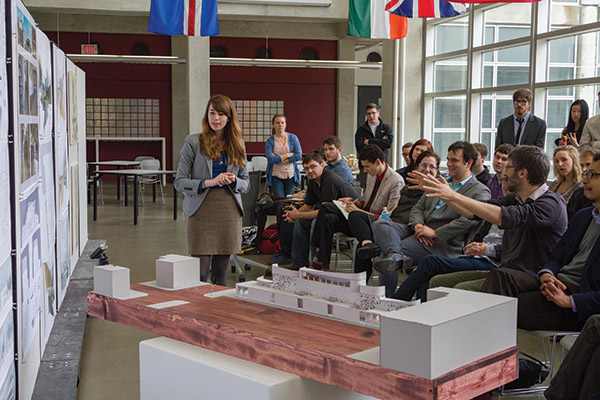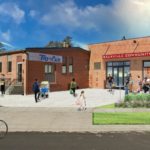Making a Difference
Students at University of Wisconsin–Milwaukee School of Architecture & Urban Planning put their training into action facilitated through a number of top honors.
The Leenhouts Scholarship
Introducing Gerri Witthuhn, the 2016 Leenhouts Scholar
The Leenhouts Scholarship is the legacy of Lillian & Willis Leenhouts (FAIA) who practiced architecture in Milwaukee from 1945 to 1990. The work is characterized by sensitivity to site, poetically marrying the beauty of nature with passive solar design, and functional planning. Typically designed with a modest yet sensitive public presence, the work examines the role of communal spaces and their relationship to the outdoors.
Lillian was a co-founder of the University of Wisconsin–Milwaukee School of Architecture & Urban Planning, was the first licensed female architect in Wisconsin, and served as the first woman on the Wisconsin Architectural Licensing Board. She received an honorary doctorate from UW–Milwaukee, and in 1975 she and Willis were inducted into the AIA College of Fellows. In addition to building communities physically, Lillian and Willis built them by reaching out to the community. They taught construction repair to low-income homeowners and renters and conducted art, reading, gardening, and music lessons for under-privileged children. Lillian established the Architect’s River Committee and was an early supporter of the cleanup of the Milwaukee River and catalyst for the Riverwalk.
Building their reputation on modernist design with regional and environmental sensitivities, the firm designed over 500 built and unbuilt works. Lillian’s strength of character and commitment to architecture serve as inspiration for a $5,000 annual scholarship offered at the School. It was initiated in 1990 with contributions from professional associates and friends of Lillian and Willis Leenhouts and has supported 26 scholars including this year’s scholar Gerri Witthuhn.
Gerri Witthuhn is an MArch student with a BS in Political Science and Anthropology from UW–Madison. She was awarded a fellowship position with Environment America where she advocated for legislation that promoted the protection of clean air, clean water, and open spaces. In 2009, Gerri traveled to Namyangju-si, South Korea where she taught English courses at a rural elementary school as well as a women’s community group. She returned to the U.S. where she attained her LEED accreditation and volunteered on the Wisconsin Green Building Alliance North East Steering Committee. To further her interest in sustainability and public interest design Gerri worked as a project assistant at Community Design Solutions, and interned at 450 Architects and HGA.
Research Internships
With Valerio Dewault Train (Chicago) and HGA (Milwaukee)
The School has sixteen week research internships with Valerio Dewalt Train and HGA. The students that are selected receive a $3000 stipend and work in the firm’s office on a research project of interest to the firm and in line with the student’s skill set. Interns are required to produce a written document detailing their activities.
In 2015, PhD student Payman Sadeghi conducted building performance research for HGA. This included conducting pre- and post-occupancy evaluations for research purposes, conducting literature searches, and collecting quantitative and qualitative data. Interns at Valerio Dewalt Train have been part of an ongoing four year project called “The Future of the Future.” Each summer focuses on a different typology; beginning with The Future of Work in 2013, followed by The Future of Learning in 2014, the Future of Pleasure in the summer of 2015, and a retrospective in 2016.
For more information please contact Chris Ciancimino (ciancim2@uwm.edu), Development Director at the School of Architecture & Urban Planning.
Race To Zerond
“Forward House” Places 2
A team of students from UW–Milwaukee (Jonathan Nelson, Laura Valdivia, Nasim Shareghi) and UW–Madison (Robert Schaffer, Jacob Moffat, Daniel Baker, Drew Dillmann, Nicholas Scharping) placed second in the U.S. Department of Energy’s Race to Zero student design competition.
Under the guidance of Professor Mark Keane (UW–Milwaukee) and Dr. Michael Cheadle (UW–Madison), Team Forward, named after Wisconsin’s state motto, participated in the Urban Single-Family Detached Housing category of the competition. The annual design challenge asks college students to develop sustainable homes so energy-efficient that renewable power can offset most or all of the annual energy consumption and is based on real-world scenarios where builders develop high-performance homes or update existing designs.
“Forward House,” the team’s entry, is located in Milwaukee in a neighborhood blighted by foreclosure in the 30th Street corridor. A return to a classic Wisconsin craftsman style with a Milwaukee flair will help reinvigorate the neighborhood while remaining true to its roots. The overarching goal is to provide an affordable home with a people-centered interior design that will deliver comfort and high-energy performance, reducing the cost of living for a first-time home owner.
Community was an important part of the overall design, and the mechanical systems team—coupled with the architecture team—collaborated to maintain the craftsman feel while optimizing performance. The goal of the HVAC system is to minimize upfront equipment cost without compromising performance. To this end, the domestic hot water system and cold weather heating have been integrated into one system with easy to install ductwork. The envelope was designed to be easy to install and to minimize the effects of the harsh Wisconsin climate using high insulation values.
The hope is that the net-zero performance and efficiency of Forward House will provide not only comfort, but also more financial security to the occupant through reduced utility bills. The chosen location is similar to many of the vacant lots in the area, so the design strategies of Forward House should be able to extend beyond the bounds of the current lot and impact an even larger community.




